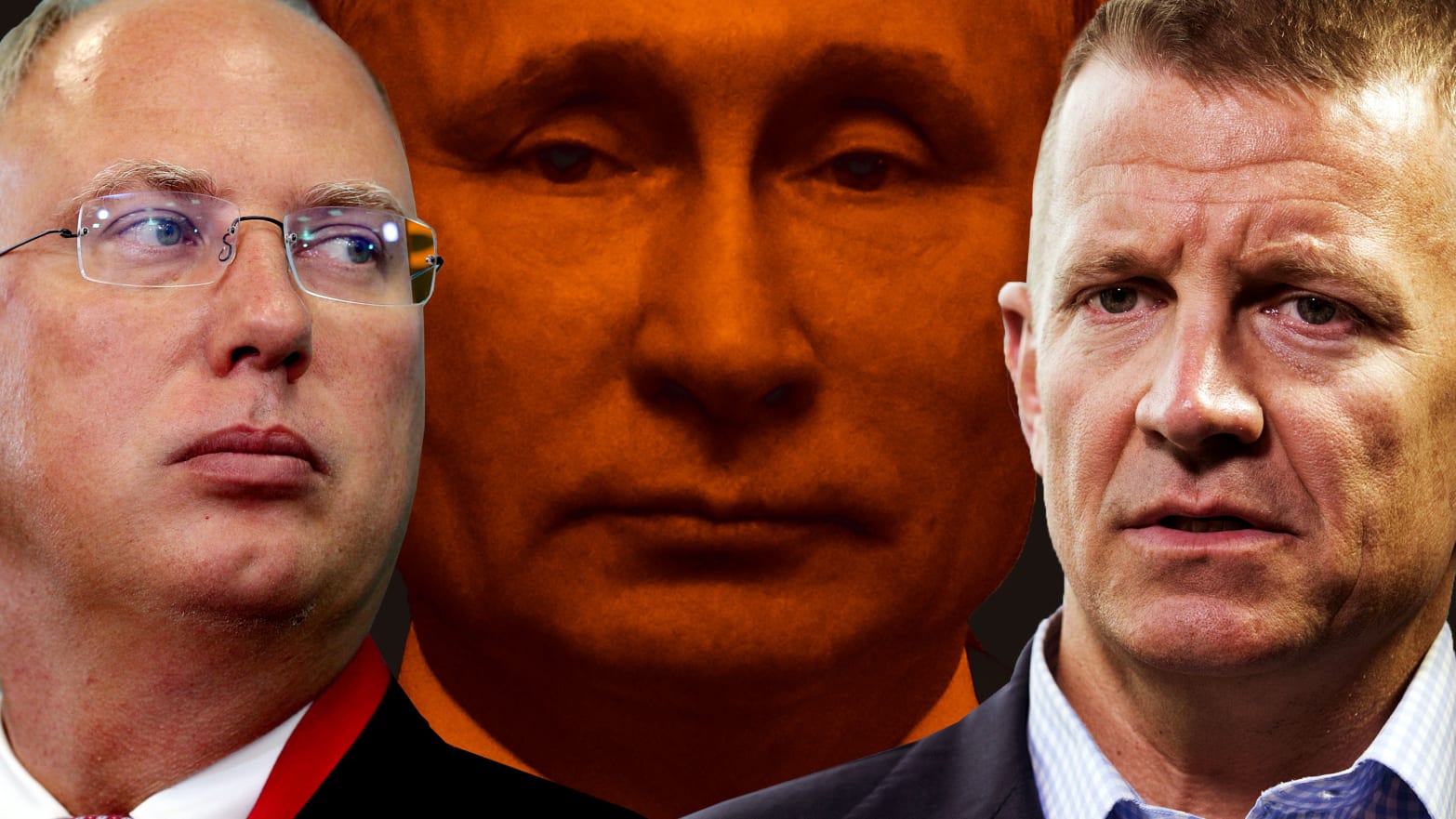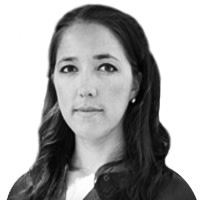That now-infamous meeting in the Seychelles with Trumpworld associate Erik Prince was a single strand of a broader campaign. In the days before Donald Trump’s inauguration, an ally of Vladimir Putin’s reached out to at least three additional individuals in close contact with the Trump transition team, according to materials reviewed by The Daily Beast.
“We want to start rebuilding the relationship in whatever is a comfortable pace for them. We understand all of the sensitivities and are not in a rush,” according to a November 9, 2016 communication from Kirill Dmitriev, the head of one of Russia’s sovereign wealth funds. That communication was sent to George Nader, the Lebanese-American businessman who helped broker the meeting between Dmitriev and Prince in the Seychelles, and forwarded on to third parties. Nader is cooperating with Special Counsel Robert Mueller’s probe of foreign influence in the American political system.
“I am at their disposal to discuss things anytime as I think that we can be helpful in guiding this relationship understanding each of the sides well :),” Dmitriev’s communication continued. “My boss sends his warmest greetings and I will see him again early next week.” Dmitriev and Russian President Vladimir Putin both attended a financial summit in Lima, Peru the following week.
It’s unclear from communications reviewed by The Daily Beast if Dmitriev was representing himself as the CEO of the Russian Direct Investment Fund (RDIF). RDIF in past statements to The Daily Beast has categorically denied that the fund is influenced by the Kremlin or President Putin. International businessmen, too, told The Daily Beast that they view the fund as a purely financial institution that has gained notoriety for successful investment deals.
On January 11, 2017, Dmitriev held his meeting on the Indian Ocean archipelago with Prince, the former head of Blackwater. Shortly afterwards, he distributed a memo to various Trumpworld figures proposing that Washington partner with Moscow on a number of military, energy, and financial projects. The memo, revealed exclusively by The Daily Beast last week, was characterized as a readout of the Seychelles confab. In a statement, a representative for Dmitriev denied the existence of a memo or read-out related to conversations that took place in the Seychelles.
Sent from the 2017 World Economic Forum in Davos, the memo appears to be one of the earliest reported documents that set out a blueprint for how to improve U.S.-Russia relations under a Trump presidency.
The memo was distributed to individuals who represented themselves as having the ability to get the document into the hands of President Trump’s senior aides, according to materials viewed by The Daily Beast. The memo circulated just days before President Trump’s inauguration at a time when his team was actively forming plans on how to improve relations with Russia, including easing sanctions against the country. Dmitriev’s fund, the RDIF, was and still is under U.S. sanctions, though it is legal to conduct business with the entity under certain circumstances. It is also legal to meet with its leaders.
Dmitriev was one of more than a dozen Russians who reached out to the Trump team during the transition period. Many of those individuals have come under scrutiny by Special Counsel Robert Mueller, who is investigating foreign interference in the American political system. Dmitriev, who heads arguably one of the most powerful entities in Russia, has flown under the radar despite his repeated communications with individuals who met several times with Trump’s main advisers, according to materials reviewed by The Daily Beast.
“We believe that the ultimate goal of these reports is to attack and smear those persons who are making an effort to improve relations between Russia and the United States,” a spokesperson for RDIF said in a written statement to The Daily Beast. “RDIF firmly believes that restoration of good relations is in the interests of both Russia and the U.S.”
During the past two years, Dmitriev has emerged as an influential player in working to broker better relations between the U.S. and Russia. Dmitriev worked not only to promote trade between the two countries—a topic he often speaks about on television—but also to normalize diplomacy between Washington and Moscow, according to materials reviewed by The Daily Beast and interviews with those who know him professionally.
“Dmitriev is a very westernized guy who is the face of Russia, at least of Russian business, at conventions and forums all over the world,” according to one individual who spoke on a panel with Dmitriev at Davos in 2017 and is connected to investment leaders across the globe. “Everyone views him as a really influential person with a lot of political connections.”
Although the U.S. has continued to sanction Russian oligarchs and individuals close to Putin since Trump’s election in 2016, the U.S. and Russian business communities have done their best to carry on as usual.
“The business relationship is better than it might seem,” said Alexis Rodzianko, the CEO of the American Chamber of Commerce in Moscow, an organization that advocates for U.S. business in Russia. “The sanctions have so far been a problem like weighing things down and slowing people’s decisions. Both investors and U.S. companies are thinking twice or ten times about investing in Russia. That said, businesses are doing relatively well.”
Sectoral sanctions—part of the sanctions passed in 2014—do not rule out business cooperation between the U.S. and Russia altogether. And Dmitriev over the years has latched on to that reality, promoting increased trade between the two countries on countless television shows across the world.
“These restrictions do not preclude from co-investing with us, do not preclude from meeting with us,” Dmitriev said in a recent CNBC interview. “We will continue to work with top investors from all over the world. None of this is restricted activity.”
Part of Dmitriev’s power, those who have worked with him said, comes from his reputation in the both the political and financial realms in Russia. Three people who either know Dmitriev or have worked with him say he has been in close contact with President Putin and at times refers to him as his "boss," according to communications reviewed by The Daily Beast. By Russian law, Putin appoints the CEO and the supervisory board of RDIF. Dmitriev met publicly with Putin several times throughout 2017 and 2018.
“Dmitriev is a very mild guy—a calming influence. He is very much a bureaucratic player in Russia and is good in his role.” Rodzianko said. “RDIF is the Russian door-front for investment. If you look at their supervisory board its a who's who of the Russian government. If you open their website there are pictures—the faces of those who run the country.”
Despite his high-profile position as the head of one an investment fund sanctioned by the U.S. Treasury, Dmitriev has evaded any sort of official public scrutiny, at least until reporters revealed he had met with Prince in the Seychelles in an apparent effort to set up a back-channel between Trump and Vladimir Putin.
Prince testified in front of Congress that the meeting was a chance encounter and that the two men discussed improved trade relations "over a beer." But materials reviewed by The Daily Beast show the meeting was set up in advance. And the memo, which The Daily Beast viewed, includes a much wider range of topics than what Prince revealed during his testimony.
The memo not only proposes that the U.S. and Russia worked together to fight ISIS in Syria via a joint military operation that would take out a key leader of the terrorist group. The document also suggests a U.S.-Russia financial partnership, which would include RDIF investing in the Midwest. Lastly, the memo proposed the U.S. and Russia set up a small working group with “2-3 people from each side authorized to finalize an action plan for a major improvement in the U.S.-Russia relationship.”
Whatever the conversation in the Seychelles, the memo appears to deal with subjects outside the scope of Dmitriev’s formal responsibilities as CEO of RDIF.
“We believe there is a huge opportunity to reset Russian relations with the U.S. We are very impressed with President-elect Trump’s position that he wants to have good cooperation with Russia,” Dmitriev said in a November 2016 interview with CBS. “We believe with [Trump] there is a possibility to work jointly between Russia and U.S. on such issues as fighting terrorism and to make sure that our economies continue to grow as we provide access to each other to our markets.”
From the Davos World Economic Forum, five days after his meeting with Prince, Dmitriev appeared yet again on CNBC, reiterating several points from the memo and praising the incoming Trump administration for its “professionalism.”
Dmitriev echoes his televised comments in communications in the days following the forum. In those communications, Dmitriev acknowledges concerns by members of Congress regarding sanctions and his interactions with Americans at Davos.
“We are aware of the comments of some of the senators,” he says. “I just wanted to sent this to clarify things and believe that we can majorly improve U.S.-Russia relations.”
At the Davos forum, Dmitriev distributed a letter to multiple American attendees—including senior executives and CEOs of private equity companies and other financial services companies—on relations between the Russian and American business communities, according to one Davos attendee.
The letter expanded on Dmitriev proposed to recipients a conference in Moscow focused on mutually beneficial business opportunities, the source added. The conference never came to fruition.
“I don’t think people in the U.S. wanted to touch it because of the specter of the sanctions,” the source said.
However, U.S. individuals involved in the investment community did attend the St. Petersburg International Economic Forum in June 2017 and met with Dmitriev and Putin, as well as other world business leaders. Ari Emanuel, Trump’s longtime friend and former agent, attended the invitation-only meeting. Emanuel is also the co-CEO of William Morris Endeavor (WME), an entertainment and media agency. Emanuel, the owner of Ultimate Fighting Championship, would one year later announce a joint venture with Dmitriev’s RDIF as well as China and the UAE’s sovereign wealth funds to promote events in Russia.
Dmitriev’s efforts to normalize trade relations between the U.S. and Russia may be in jeopardy. Congress is in the midst of deciding what steps to take to prevent Russia from interfering in the 2018 midterms. Several members have drafted sanctions bills that would exact tougher measures on the country, including sanctioning Russia’s sovereign debt—a move that would represent one of the toughest hits to the Russian economy since its annexation of Crime in 2014. It is unclear when Congress will vote on the measures.
“As a sovereign wealth fund, sanctioning us strongly would create a precedent for other sovereign wealth funds to really pull their money out of the U.S. economy,” Dmitriev said in a CNBC interview in May. “We think that frankly sanctions are just ridiculous to begin with.”


